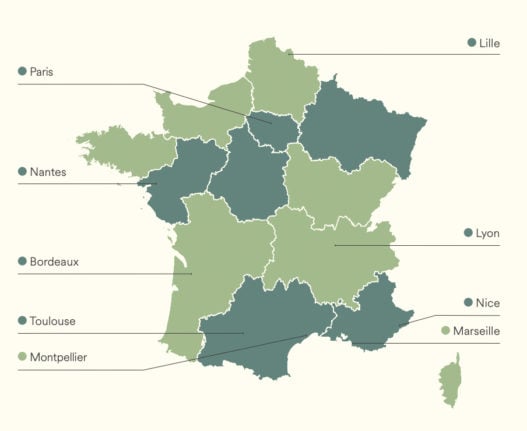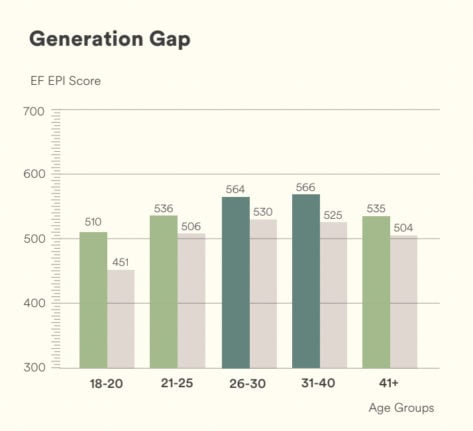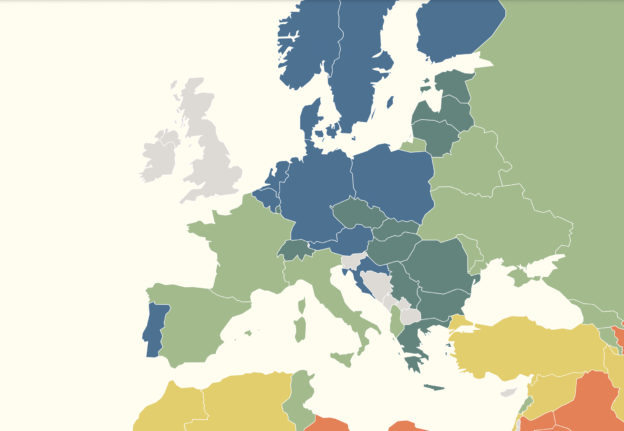If you are looking to take a holiday in France sometime soon, and you feel less than confident about your French, you might be a bit shaken by France’s ranking as the least English proficient country in the EU.
The global scores for the Education First English Language Proficiency test have been released, and they showed that France remained in the “moderate” grouping, though with lower scores than many of its European counterparts, including Spain and Italy – countries it has outperformed in previous years.
But the real picture is more complex, as some French cities faired better than others. Paris, for instance, had a higher English proficiency score than both Madrid and Rome.
READ ALSO: ‘I feel ridiculous’ – Why the French dread speaking English
And within France, there were some interesting trends. Bordeaux came out on top in terms of English ability – three points higher than Paris, in fact, who ranked third. It was the city of Toulouse that came in second place.

Six French regions ranked “high” instead of moderate on the test, and the best scores (in order) were from Île-de-France (the Paris region), Pays de la Loire, Occitanie, Provence-Alpes-Côte d’Azure, Grand Est and Centre-Val de Loire.
While most cities scored “high” instead of “moderate,” two trailed behind the others with the lowest scores – those were Marseille (in second-to-last place) and Montpellier, who performed the worst out of all French cities.
Regionally, the regions with the lowest English levels in mainland France were Burgundy, Brittany, and Hauts-de-France.
And if you go up to anyone on the streets of France, hoping they speak a little English, the study also found that those aged 26 to 40 were most likely to score “high” instead of “moderate.”

Overall, France did see a slight decrease in its general English proficiency – last year the country came in 31st place internationally, but this year it fell to 34th. The national average dropped about ten points on index, while in comparison, France’s neighbour, Italy, gained 13 points and moved up from 35th to 32nd on the global ranking.
When taking a more detailed look at France’s score, a representative from the EF EPI organisation told The Local that French scores specifically “went down in the 18-20 and the 21-25 age groups.”
The representative added that this could be related to the pandemic, though the organisation does not collect specific data on why language proficiency might be changing.
READ ALSO: Why the French struggle at English so much
“This decline in the youngest adults was already visible last year (France’s overall score also dropped last year). A decline for 2 consecutive years in only the youngest age groups which were previously either stable or improving seems to point to a pandemic effect,” said the representative.
Out of all European countries – not just members of the EU – France came in 26th place, right ahead of Ukraine and behind Spain, meanwhile the Netherlands topped the charts coming in first place for the fourth year in a row.

Why are the French so poor at English compared to other countries?
Native English speakers can hardly criticise the French for being bad at a foreign language but there are reasons why the French struggle compared to other countries.
Speaking to The Local previously Education First’s Adeline Prevost said: “There are a few reasons we struggle to learn English, and I think one of the main ones is that we lack exposure to English here in France. For example we don’t get many films in VO – because French is a widely spoken language, we get translations without a problem.
“In other countries, for example Sweden, where the language is not spoken around the world, translations from English are not available so easily so people have more exposure to English.”
Teachers have also criticised the quality of English language teaching in French schools.
But Francette Popineau, Co-General Secretary and spokesperson of the largest teacher’s union FSU-Snuipp suggested to The Local that perhaps children in France should be learning less English.
“This English hegemony bothers me a little bit,” she said.
“It’s a very practical language, but it’s not necessarily the language the children are speaking.”
Rather than pushing for a reinforced universal English training, Popineau believed the government should reinforce the languages children in France already spoke at home.
“It could be Chinese, Arabic or Spanish. No language should be set aside to make room for another,” she said.
“Besides, after Brexit, perhaps it’s time to ask ourselves to reconsider the place we are giving English in Europe.
“Is the European language really going to be that one of a country that is no longer there?”



 Please whitelist us to continue reading.
Please whitelist us to continue reading.
Visiting a local doctor in France (displaced hip joint, thank you for asking – it’s fine now), and he complimented me on my French, which is at a reasonable conversational level.
He then asked, ‘Do you know what the French is for someone who speaks two languages?’ And of course, I responded, ‘Someone who is bilingual – Une personne bilingue’.
‘And do you know what the French is for someone who speaks one language.?’
I essayed, ‘Une personne monolingue?’
‘No’ he said, dryly. ‘A Frenchman.’
Francette Popineau should do her homework. The Republic of Ireland has always had English as its main language. Even in the Gaeltacht few people speak only Gaelic.
Madam secretary: English is the principal language in the Republic of Ireland, which has not left the EU.
Just a quick reminder that English is an official language of 2 EU countries – Ireland and Malta – so I’m not sure Popineau’s last question is terribly pertinent.